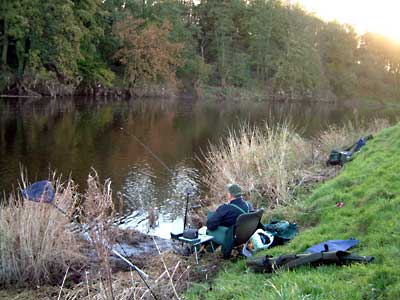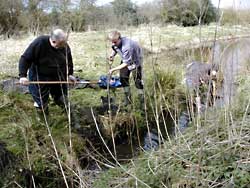Funding For the majority of clubs the greatest challenge is to balance the money coming with that going out. Ideally there should be enough left over each year to build a nest egg that might one day enable the acquisition of new waters and the development of existing waters etc. In a given year, provided two factors are reasonably constant, that membership reaches the usual level, and there are no unforeseen financial demands, like massive increases in rent, then the books ought to balance. Oh, that life should be so simple. Developing new waters A small club with an annual surplus of say £ 1000 or £ 2000 is simply never going to be able to buy or develop a new fishery. Just the fees for planning permission cost that much, never mind the land, digging, landscaping and stocking. Start at a hundred grand and work upwards. Sure, some very lucky and very hardworking small clubs have created small fisheries from derelict bogs in the past, but for most a lease is as much as can be hoped for. In my letter to AT I suggested that if John Williams of the BAA could persuade his membership to give him the money he needs the BAA would be able to develop its own equivalent of Moorlands Farm and Makins. Although 11,000 times £ 24 plus day ticket income might sound a lot by the time the rents are paid it becomes clear that far more money is probably required. As the £ 24 is, in my opinion, ridiculously cheap, I reckon that he is going to have a major fight on his hands to get that up to the level required. Just what the level should be is hard to predict but think what he could do with a million or two coming in every year. One idea I’m going to sow on this topic is having a two-tiered membership. It would work something like this – the club develops a new water that is available to members paying an increased fee, say not less than £ 100, where the usual fee is, say, £ 40. Those paying the £ 40 can fish the new water but pay a day ticket at slightly reduced rate – say £ 5, whereas the £ 120 members can fish for free. Day tickets might also be available at, say, £ 6. Just an idea. Another idea I’m going to sow is that a club, by its non-profit making nature, can provide a type of fishing that a commercial fishery cannot afford to offer. The fishing may not be so good in that hundred pound bags are not commonplace but what a good club water can provide is good fish in good surroundings with much more interesting fishing to boot. By getting away from the seven yard pegs, uniform depths, and heavy overstocking a strong element of watercraft brings a satisfaction of its own. Club fishing is too cheap As any club secretary will tell you the average club angler will spend considerably more on a day’s fishing than a year’s membership but complain like hell if you so much as dare suggest a £ 1 increase at the Annual General Meeting. There is a very strong case for empowering the committee to set the membership rates. One Dorset club famously let a small band of members propose a new rate at the AGM of half the previous one to boost membership. It didn’t, and the result was a slow decline to near oblivion. The fact is that a typical club membership of £ 30 covers the equivalent of four to six day tickets, far less for those commercial waters charging by the rod, and separate tickets for day and night. For this insignificant sum the member expects to fish for 12 months, on a variety of waters, with both fantastic fishing and facilities such as good car parking and loos. Quite frankly, he’s having a laugh. One of my local clubs has no less than forty waters, with excellent fishing and facilities. The fees are several times the £ 30 though and there’s no shortage of potential members. If club members want seriously good fishing then the days of £ 30 per annum are gone. Decline in river usage I don’t propose to rerun the river close season debate here. With the declining angling pressures on most rivers I can accept that lifting the river close season might not make a lot of difference to the quality of sport. But I stick to my guns in that lifting the river close season will not bring back the anglers who have already stopped fishing the rivers. Where, however, does this leave clubs faced with paying rent for under-used stretches of river? It’s a case of diversify or die. One successful tactic for clubs has been paying to obtain a concession at day ticket still waters. By doing this, the club retains members sufficiently to retain at least some of its river holdings. In addition it is vital to maintain the river fisheries so that they do not become completely overgrown jungles and remain usable. Never have so many owed so much to so few With the greatest respect to the heroes of the Battle of Britain, the problem that has probably faced the vast majority of clubs for centuries, and this applies just as much outside angling, is that clubs are often run by a very small number of people. In many cases just one or two; the secretary and treasurer. There may be twelve or fourteen officers and committee but the important decisions and most of the hard work rests on only one or two. I know, I’ve been there. You just have to hope that the indispensable individual has an understanding wife, doesn’t move away, change jobs, get completely fed up or quit. For a small club of up to about two hundred members this may suffice but bigger clubs are going to need professional help at least some of the time. This can include legal, fishery management and accounting skills.
Another danger is that members of the committee may become armchair anglers and lose touch with what’s happening on their angling scene. So there is a strong case for recruiting fresh blood (and youth) to a committee on a regular basis. Often the opposite occurs with the long-standing incumbents virtually impossible to shift. This should not be carried out to extremes as a few wise old heads can help steer a steady course. Supply and demand is not always what it seems One of the more subtle arguments about the close season was about the feeling of expectation that arises for the glorious 16th. What came out was that year-round fishing can lead to a jaded appetite. Thinking about this further, I realised that this also seems to apply to clubs, which surprised me. What I found was that clubs that impose the old close season on stillwaters as well as that imposed on rivers are stronger than those that open all of their waters as far as possible. It really does seem as if absence makes the heart grow fonder, and the enforced layoff works in the clubs’ favour. The collective waiting for the 16th enhances the expectation and gives a definite starting point for the season’s fishing. Hard to explain, but the waiting lists for the clubs operating this way back it up. I will temper this by saying that the clubs with waiting lists have got waters worth waiting for. The NFA At one time the NFA represented over half a million anglers, though how many were counted more than once is impossible to fathom. As match fishing declined the big associations began to question why they should continue to support what was in their eyes an organisation that only ran Nationals. Unfair of course, but what seemed to be subsidising a day out for a dozen of their members became hard to justify. Instead they preferred to spend the money saved on providing fishing for all of their members. The loser is the NFA, and coarse anglers generally in losing what ought to be their strongest voice. Whether the NFA can reverse the trend remains to be seen but my view is that there is a steep mountain to climb. I should like to see the NFA shouting from the rooftops what a fantastic advantage membership offers. Supporting the ACA The ACA will provide assistance to clubs that are members therefore all clubs really must belong. So not only should you the individual be a member but also your club should be a paid up member. See www.a-c-a.org for details. Conclusion Money is only part of the problem, competing with and complementing commercial fisheries, and meeting the changing demands as angling evolves are others. Members of angling clubs are going to be faced with a stark choice – if you want cheap you will get cheap that might eventually mean very little at all. But if you want more be prepared to dig into your pockets, and if able find time to support your club in creating the waters you want. Further reading: ‘Angling – Fundamental Principles’ by Barrie Rickards. |
Welcome!Log into your account












